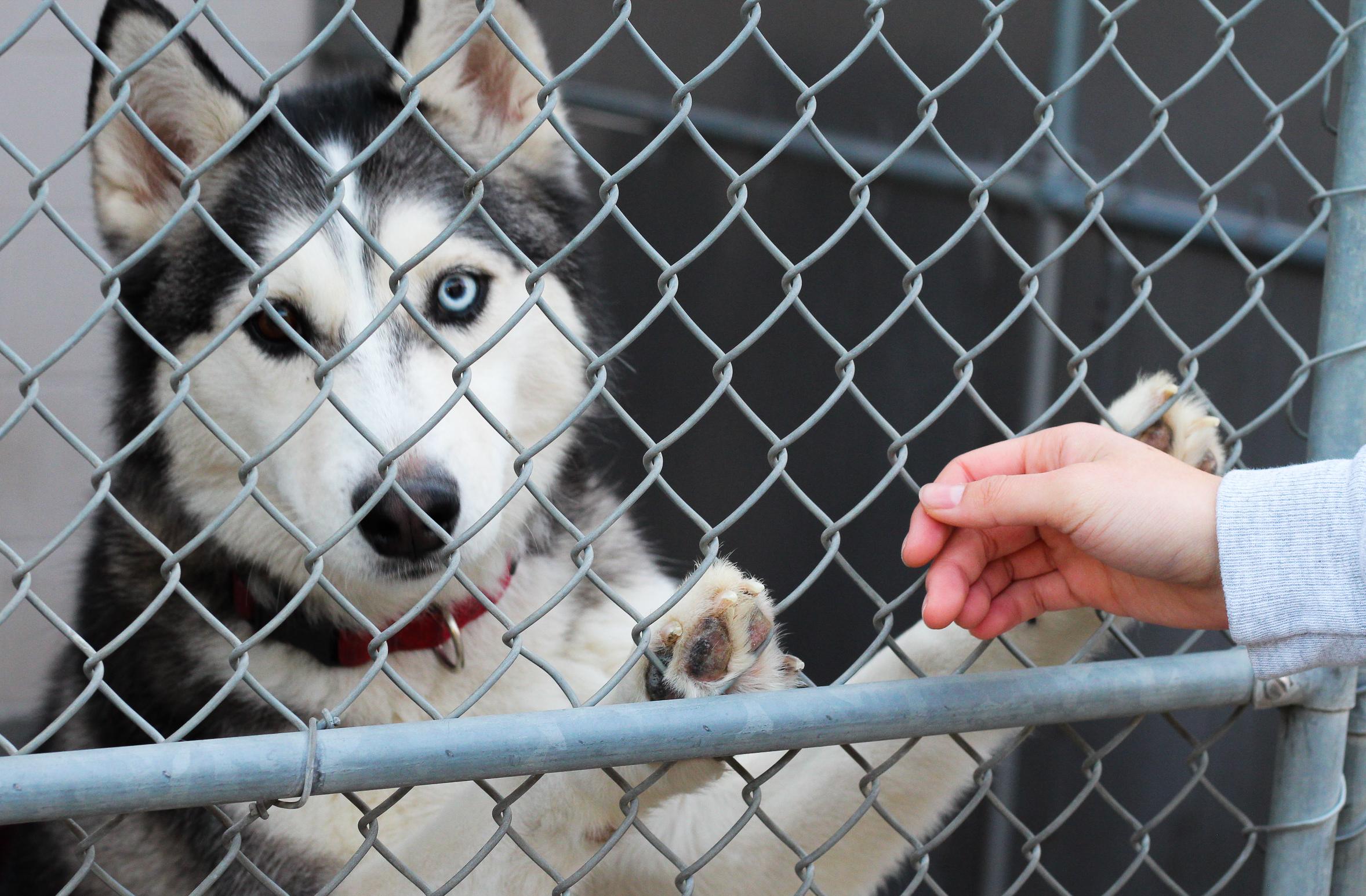Inside Animal Shelters
A motion sensor flashes the lights on when visitors walk into the dog kennels at the Sacramento Front Street Animal Shelter. Inside each room, visitors are greeted with the distinct smell of dogs. In kennel after kennel, huskies, pitbulls, shepherds and mixed breeds of all kinds jump on the wired gates of their kennels, pushing snouts through to lick any hand they can find. Some bark and whine as visitors move along the corridor. Others sit in the back of their kennels, shaking, but never getting up.
“We’re feeling very full,” said the shelter’s Public Information Coordinator Haley Waugh. “We’ve got lots of dogs, so we’re trying to get them adopted as quickly as we can.”
Front Street is responsible for taking in sick, injured and abandoned animals found in the city of Sacramento. In 2021, the shelter filled its kennels with 3,386 dogs and 2,765 cats. Most were strays.
“If an individual finds an animal, they can call 311 or come to our shelter,” Waugh said.
Sometimes animal owners surrender their pets to the shelter. Sometimes they ask to have their pets euthanized. Every dog and cat has a story.
Once an animal is accepted into the shelter and has not been reclaimed by its owner, the shelter staff may transfer the animal to a rescue group or determine if the animal is safe to adopt. At that point, the public can come in and visit the animal.
“They will go through a meet-and-greet process with one of our adoption counselors who will figure out if it’s a good fit, and if it is, then they get to adopt that animal and take it home,” she said.
One method the shelter uses to determine if a dog is a good fit for a potential owner is by assigning a “dog handler level” label for each dog.
The levels range from one to three. Level one is for dogs that are good for people who may have never had experience with caring for a dog, while three is for more advanced dog handlers who know how to work with high-energy dogs.
“It just helps to guide people to figure out the dogs that they’re comfortable working with,” Waugh said.
In 2021, people adopted 3,324 dogs and cats from Front Street. They also adopted 3,086 from the Sacramento SPCA, and 3,675 from Sacramento County’s Bradshaw Animal Shelter, the two other main shelters in the area.
Adoptions do not always work out. In some cases, animals are returned to their shelters, often due to compatibility issues between the owner and the animal or the relationship between other animals in the household.
“There are lots of things that we learn when they go out into adoptive homes, and if it’s not a good fit, that’s totally okay, because then we get a lot of information back from the adopters that can help them get placed into a better home the next time,” Waugh said.
In 2021, Front Street experienced a total of 193 adoption returns and Bradshaw had 361.
Many of the animals that were not adopted left the shelter under other circumstances. Some were returned to their owners, some were euthanized and others died in the shelter or in foster care.
Ways to Help
The ultimate goal of shelters is to find every animal a forever home, but not everyone can commit to caring for a dog or cat for life. So what can you do to help, even if you can’t adopt?
One way is by volunteering, either at a shelter or by becoming a pet foster parent. Front Street holds a program specifically for high school volunteers to perform community service hours. Students 16 or older have several opportunities to work with animals in the shelter and do chores around the shelter.
“We need help every morning cleaning our kennels, doing laundry, washing the dishes, all of these things that make it so we’re able to provide the best quality care for our pets and make sure that they have clean bowls to eat out of and warm blankets,” Waugh said.
Donating is another way to help out. With the money, shelters are able to purchase medical care supplies and other resources needed for animals.
Along with money donations, shelters are also looking for physical donations such as toys, food, leashes and lots of blankets.
During the winter, dogs are in dire need of blankets to not only keep them warm, but to give the dogs a better home setting during their stay at the shelter before they are sent to their forever homes. Donated items are given to pets in the shelter and to pet owners who need help with their own pets.
Fostering
Eight kittens named Boba, Lychee, Horchata, Polyester, Flannel, Satin, Pringle and Cheeto lived with Assistant to the Head of Middle School Marisa Christie in 2021 until they were adopted from Front Street by their forever families.
“That was really insane, but a lot of fun,” Christie said of her kitten fostering experience.
In order to foster, Christie had to take a basic training online class for fosters. The two to three-hour class goes over pet care, such as what to expect from your foster pet, how to deal with medical emergencies and how to clean up after them.
So far this year, Christie has fostered three dogs from Front Street. She took in two of the dogs after receiving an urgent email from the shelter asking for any foster to take them in because the shelter was overpacked with dogs.
After passing the course, Christie has fostered nine cats and three dogs since last spring.
“They become a member of the family,” Christie said.“I just think the foster program is fantastic because you have a better chance of placing the animals in a home,” she said.
Another Country Day animal lover, senior Liz Cook became a foster parent for the Sacramento SPCA.
Before she was able to hold the title, she had to take a few classes and meet household requirements to ensure a safe space for the fostered pets. Once all the paperwork was filled out, she was able to foster several dogs and give them the love and care all pets need.
The first dog she fostered was a pitbull dachshund mix named River, who was a medical foster that had been diagnosed with kennel cough, a highly infectious respiratory disease. Because of the cough, he was unable to stay in the shelter with the other dogs. Cook and her family took him in until he was healthy and ready to be adopted.
Once River was ready to be adopted, Cook wasn’t very sad or upset when letting him go.
“You kind of realize that they’re going off to an actual forever home, whereas your house is kind of like a little stepping stone so that they can socialize or get healthy again,” she said.
Along with fostering dogs from the SPCA, Cook participates in a program at the SPCA called “Foster Fur-lough.”
Through the program, certified foster parents are able to take adoptable dogs on field trips or overnight fosters to give pets a break from the shelter life before they venture to their forever homes.
Recently, Cook took a dog named Snoopy out for a day foster. They were able to play around and relax at home, giving Snoopy a look at what his forever home might be like.
Adopting
Adopting a shelter pet is good for the animal and good for the people who give them forever homes.
Junior Grace Zhao adopted Cricket, a German shepherd border collie mix, from the Sacramento SPCA in 2021.
Cricket loves to play fetch, especially with his favorite toy in the whole world: a squeaky vodka bottle.
“We looked at the dogs on their website where they have profiles of all the dogs,” Zhao said. “We found one that my mom really liked, which was Cricket.”
After booking an appointment, she went to the shelter to play with her soon-to-be adopted dog. Zhao signed some paperwork, and Cricket was ready to be taken home.
Before Cricket was brought to the shelter, he was a stray found on the street. However, he most likely had a previous owner, as he responded to the command to sit.
“He was very nervous at first, but he gained weight after we brought him home, probably because he started to relax a bit more,” she said.
During the COVID-19 quarantine, Zhao enjoyed Cricket’s companionship.
“I mean, it really is nice having a dog,” she said. “I think the reason we got him was, like a lot of people who got dogs during COVID-19, for the companionship.”
Senior Liz Cook also has adopted animals of her own.
In 2012, she adopted her dog, Rudy, when he was an adult from a spaniel rescue, and a few years later, she adopted her cat Daisy when she was 3 months old from the Bradshaw shelter.
After taking out a few cats and playing with them, Cook was set on a small black and white tuxedo cat after an adorable interaction.
“She nibbled on my fingers and I was obsessed with her,” she said. “She was really little, like she was a baby who was just over two pounds.”
At most shelters, kittens must be over 2 pounds in order to be adopted, so this kitten was in perfect condition for Cook to take home.
Cook said she chose to adopt her pets because there are too many animals in shelters that need a home.
“Everyone wants purebred, and I don’t think it’s dumb, but I think it’s short-sighted because shelter animals are just as good, even if they’re not purebred,” Cook said.
— By Ava Eberhart and Zema Nasirov
This story was originally published in the Dec. 13 issue of The Octagon





interesting that you use 2021 adoption return numbers…. did you even check 2022’s? was this just a PR piece did you actually want to report factual information? because adoption returns at front street for 2022 are sitting at a whopping 400 as of today… Additionally, the returned animals often get put at risk to be added to their rescue kill list. ALSO, owner surrenders, per front street’s website are now supposed to go to the sac SPCA… So if the owner surrenders are that many, they must be coming in from the aco’s in the field.
Directly from Front Street’s website:
Pet Surrender As The Last Option
If you are still unable to keep or rehome your pet after following the tips above, contact the animal shelter in your jurisdiction that accepts owner surrenders. For Sacramento residents, that is the Sacramento SPCA. More info at sspca.org/surrender. Due to high demand, there may be a 3-4 week wait for an appointment to surrender.
Thank you for your comment. The Octagon’s reporting was based on 2021 data because that was the most recent full year of data available for all three shelters at the time of our reporting. For some 2022 data, please visit these links on the shelters’ websites.
– https://www.sspca.org/data
– https://animalcare.saccounty.gov/Pages/OurStatistics.aspx
– https://www.cityofsacramento.org/Community-Development/Animal-Care/About-Us/The-Numbers
We apologize for the misunderstanding!
Sincerely,
Samhita Kumar and Adam Akins
Online Editors-in-Chief